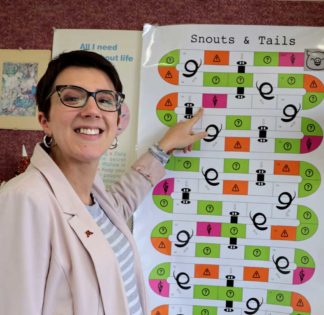By Jon Jeffryes
“Focusing on teaching projects can be difficult,” says Veterinary Medicine faculty member Perle Zhitnitskiy.
“They require planning and time. Often, other more pressing things show up,” Zhitnitskiy says. “There is a research grant due or meetings to go to, and we end up teaching our classes the same way we have always done because we have not had the chance to act on this idea we would like to implement in our teaching.”
The University of Minnesota Libraries developed a solution to support teaching innovation within busy schedules. Along with Academic Technology Support Services, the Center for Educational Innovation, and the Disability Resource Center, the Libraries collaborated on a Teaching Sprint to help faculty make significant changes to their teaching in a short period of time.
Building off the work of Purdue’s Instruction Matters: Purdue Academic Course Transformation and using the successful Libraries-sponsored Research Sprints as a model, the Libraries and its partners created a space and time for faculty to focus on creating new teaching approaches. In June 2019, the group launched a pilot Teaching Sprints program with 10 groups working together on new ways to teach.
Teaching swine antibiotics as a game
Zhitnitskiy wanted to use a game to engage student learning in her swine medicine class. She partnered with librarian Kristi Jensen and academic technologist Jennifer Englund to create the game, which students ultimately named Snouts & Tails.
Zhitnitskiy came to the sprint with the idea of a board game centered on case studies. Students would read the case studies and then answer questions to move across the board. Jensen and Englund were able to help think through the information and technology necessary and assist with building an open access ebook of case studies.
“I felt that they both tried to figure out what my vision was and fit to it as much as possible.” Zhitnitskiy says.
“Bringing together both our individual creativity and the wide range of skill sets,” Jensen says, “provided for the creation of unique learning materials that aim to engage and teach students in new ways.”
The result was a new customized open access textbook, Swine Antibiotherapy Handbook, to be used in connection with the board game Snouts & Tails. By the end of the week-long sprint, the team was playing in test mode a game prototype they developed. Now, instead of listening to a lecture on the different types of swine antibiotics they might encounter, students answer questions using the knowledge they learned from studying the open textbook to compete in a game.
‘It alleviated some of the stress and created a fun atmosphere.’
Mariya Gyendina, the Libraries’ Learning and Inclusion Strategist and a lead planner of the event, saw instant benefits to pulling varied campus partners into a single location.
“I like the idea of faculty getting support from multiple units in a really intense environment where they don’t need to go chasing all the different people across campus,” Gyendina says. “Everyone is in one place, it’s very easy to ask questions and if you need someone’s expertise you can just walk across the room.”
Zhitnitskiy agrees: “That sped up the process so much!”
The collaboration also benefited students.
“The feedback I got was positive. The students really enjoyed having to use the information instead of having me lecturing them on the topic for two hours. The game aspect created a little competition,” Zhitnitskiy says, “but because students were playing in pairs it alleviated some of the stress and created a fun atmosphere.
“I have had students stop by my office and ask to borrow it so that they could play it during their own time. I thought that was a sign that they find it valuable and fun at the same time!”
From fine arts to fisheries, nine other improvement projects were developed in the most recent Teaching Sprints program. Enjoying dedicated time, taking advantage of technology and connecting with other U experts were keys to these advances in instruction.
Because of the rapidly changing academic environment, we are not sure when the next Teaching Sprints projects will begin.
- Karin Hamilton, College of Veterinary Medicine, began plans to develop online learning modules.
- Peggy Lord, College of Design, worked on updating their course to foster more student engagement.
- Kristin Osiecki and Jessie Barnett, Center for Learning Innovation, Public Health, University of Minnesota Rochester, worked on creating a new online class.
- Josh Parrill and colleagues, Student Success Center, University of Minnesota Crookston, developed a First-Year Experience Course.
- Gretchen Hansen, Department of Fisheries, Wildlife and Conservation Biology, developed a syllabus with in-class activities and assessments.
- Mike Greco and Sarah Tschida, Humphrey School of Public Affairs, developed a syllabus using flipped classroom techniques.
- Katharine Gerbner, History, developed a syllabus with active learning and writing exercises.
- Sara Blaylock, School of Fine Arts, University of Minnesota Duluth, redesigned their course to include more writing exercises and interactive elements.
- Judy Hohmann, School of Journalism, revised course content creating online learning modules and assessments.





